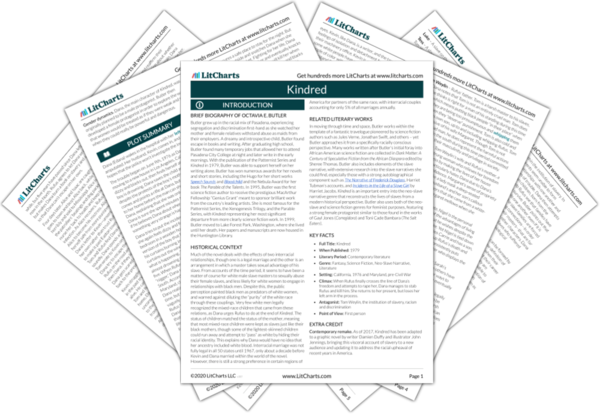Dana’s lost hand both opens and closes the novel, bookending Kindred with a reminder that Dana’s intense experience in the past may be over, but it is not something that she can move on from unmarked. Significantly, Dana seems to lose her arm because Rufus keeps hold of her wrist when she transports back to the present. Rufus’ touch symbolically represents the power that Rufus had as Dana’s master and the lingering effect that living under the white master’s thumb had on enslaved people and their children. Dana is alive, with her soul and relationship with her husband Kevin intact, but she could not return from the past whole. Her time as a slave has left a deep impression on her psyche as Dana comes to terms with the dehumanizing effects of slavery on her fragile human body.
Unlike many of the wounds, both physical and emotional, that Dana suffered from her time in the Antebellum South, the loss of an arm is a permanent disability that will mark Dana forever. There is nothing Dana can do to regain her arm, just as the systems of slavery have permanent consequences on African American lives and race relations in America. The traumas of the past are not over for the descendants of enslaved peoples in America, as the African American population still feels the effects of the years of oppression and abuse that their ancestors endured as slaves. This is not something that can easily be “gotten over” or “moved past.” Losing her arm gives Dana a physical reminder of how this history still affects her. While Kevin, a white man, is able to look forward to a future where he and Dana no longer have to be afraid of being sent back to the past, Dana’s lost arm shows how Dana will never be able to fully forget about the trauma her ancestors suffered.
Dana’s Lost Left Arm Quotes in Kindred
I lost an arm on my last trip home. My left arm.
And I lost about a year of my life and much of the comfort and security I had not valued until it was gone. When the police released Kevin, he came to the hospital and stayed with me so that I would know I hadn't lost him too.

Unlock explanations and citation info for this and every other Kindred quote.
Plus so much more...
Get LitCharts A+ "I wonder whether the children were allowed to stay together—maybe stay with Sarah."
"You've looked," he said. "And you've found no records. You'll probably never know."
I touched the scar Tom Weylin's boot had left on my face, touched my empty left sleeve. "I know," I repeated. "Why did I even want to come here. You'd think I would have had enough of the past."
"You probably needed to come for the same reason I did." He shrugged. "To try to understand. To touch solid evidence that those people existed.”












